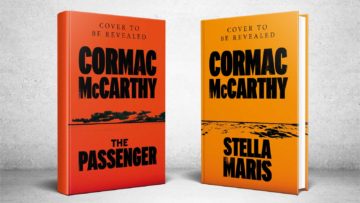James Wood at The New Yorker:
 There have always been two dominant styles in Cormac McCarthy’s prose—roughly, afflatus and deflatus, with not enough breathable oxygen between them. McCarthy in afflatus mode is magnificent, vatic, wasteful, hammy. The words stagger around their meanings, intoxicated by the grandiloquence of their gesturing: “God’s own mudlark trudging cloaked and muttering the barren selvage of some nameless desolation where the cold sidereal sea breaks and seethes and the storms howl in from out of that black and heaving alcahest.” McCarthy’s deflatus mode is a rival rhetoric of mute exhaustion, as if all words, hungover from the intoxication, can hold on only to habit and familiar things: “He made himself a sandwich and spread some mustard over it and he poured a glass of milk.” “He put his toothbrush back in his shavingkit and got a towel out of his bag and went down to the bathroom and showered in one of the steel stalls and shaved and brushed his teeth and came back and put on a fresh shirt.”
There have always been two dominant styles in Cormac McCarthy’s prose—roughly, afflatus and deflatus, with not enough breathable oxygen between them. McCarthy in afflatus mode is magnificent, vatic, wasteful, hammy. The words stagger around their meanings, intoxicated by the grandiloquence of their gesturing: “God’s own mudlark trudging cloaked and muttering the barren selvage of some nameless desolation where the cold sidereal sea breaks and seethes and the storms howl in from out of that black and heaving alcahest.” McCarthy’s deflatus mode is a rival rhetoric of mute exhaustion, as if all words, hungover from the intoxication, can hold on only to habit and familiar things: “He made himself a sandwich and spread some mustard over it and he poured a glass of milk.” “He put his toothbrush back in his shavingkit and got a towel out of his bag and went down to the bathroom and showered in one of the steel stalls and shaved and brushed his teeth and came back and put on a fresh shirt.”
McCarthy’s novel “The Road” (2006) can be seen as both the fulfillment and the transformation of this profligately gifted stylist, because in it the two styles justified themselves and came together to make a third style, of punishing and limpid beauty.
more here.
